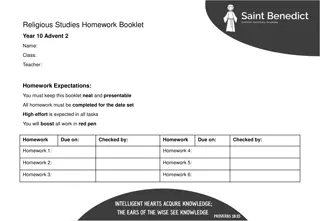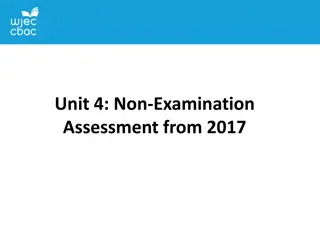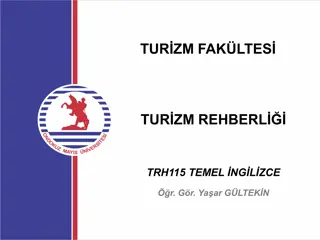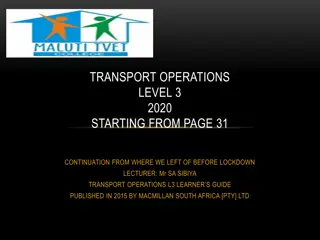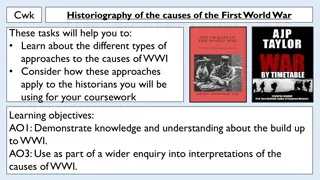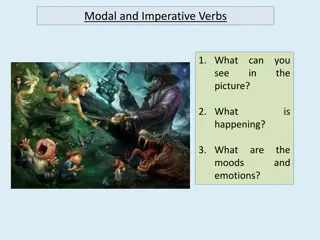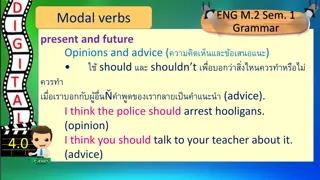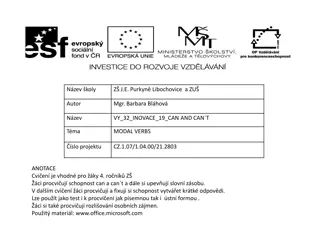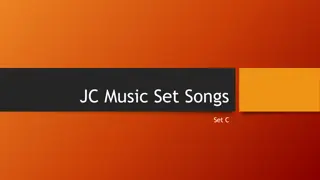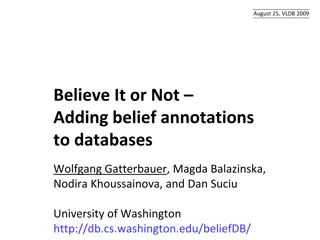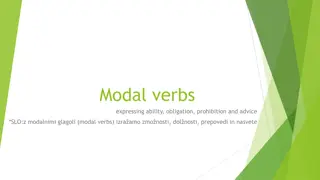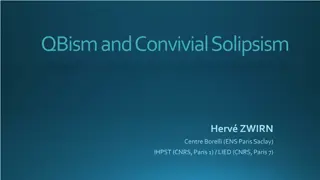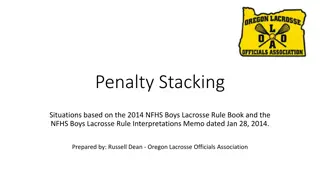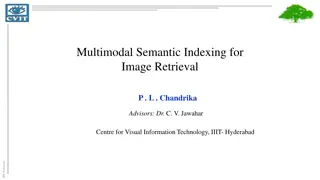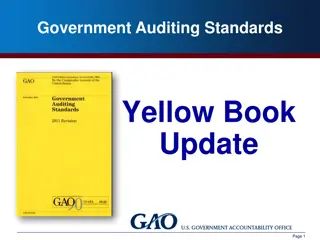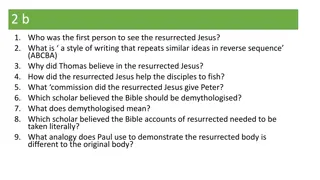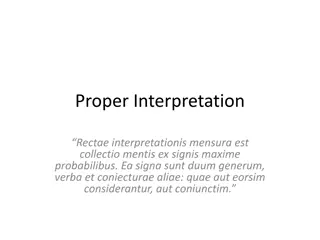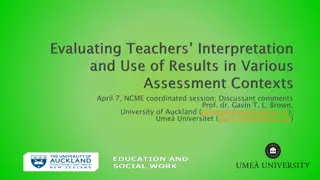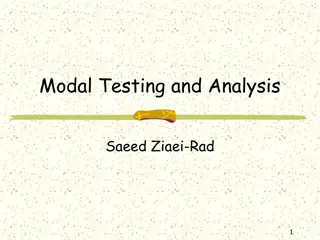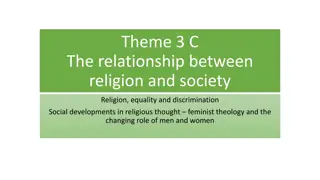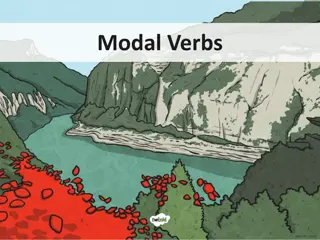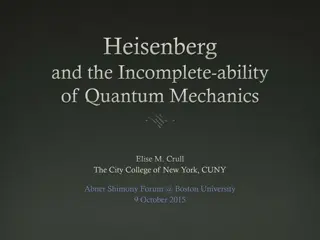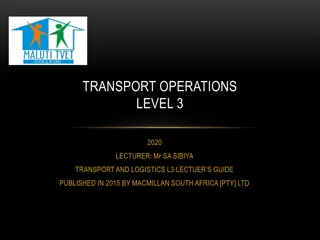Dos & Don'ts: Traffic Signs and Modal Verbs
Learn the meaning of traffic signs and practice using modal verbs in this English lesson. Improve your reading, listening, and writing skills.
7 views • 33 slides
Assertive to Interrogative: English Grammar Exercises and Practice
Enhance your English grammar skills with exercises on changing assertive sentences into interrogative ones. Learn how to transform sentences using auxiliary verbs, modal verbs, and without auxiliary verbs through practical examples and practice questions. Improve your sentence structure and comprehe
2 views • 24 slides
Exploring the Great Railway Journeys: Advantages and Disadvantages
Delve into the world of railway transport with a focus on the history of trains, interesting facts, and a discussion on the advantages and disadvantages of train travel. Discover how modal verbs are used in the past tense and practice using them in this engaging lesson.
7 views • 13 slides
MAKING RECOMMENDATIONS
Providing recommendations is a crucial skill in both spoken and written English, especially for tasks like formal essays, reports, proposals, and letters. This guide covers different ways to give recommendations using modal verbs, passive voice, gerunds, and more. Get insights on modal/semi-modal ve
5 views • 16 slides
Effective Assessment Strategies in Educational Testing
The importance of choosing the right assessment strategy in educational testing is highlighted, focusing on the use of multi-modal assessments and the selection between Selected Response and Constructed Response methods. Considerations for maximizing content validity, cognitive complexity, and authe
1 views • 19 slides
Exploring Scripture Interpretations: Noah's Ark and Incarnation in Year 10 Religious Studies Homework
In this Year 10 Religious Studies homework booklet, students delve into the concept of Incarnation and interpretations of Scripture, focusing on John 1 and Noah's Ark. They analyze the nature of Jesus as both fully God and fully Man, as well as how different interpretations of Biblical stories like
1 views • 8 slides
Unit 4: Non-Examination Assessment Overview
The Unit 4 Non-Examination Assessment from 2017 focuses on working as a historian, with tasks including source evaluation and discussion of different historical interpretations. The assessment is marked out of 40 and is worth 20% of the qualification. It assesses knowledge, understanding, source ana
1 views • 14 slides
Understanding Modal Verbs in English
Modal verbs, also known as modals, are auxiliary verbs that express attitudes and levels of certainty in English. They serve various purposes, such as indicating certainty, ability, permission, and making requests. Modal verbs like can, could, may, might, will, would, must, shall, should, and ought
0 views • 19 slides
Decarbonising Multimodal Logistic Chains: Best Practices Panel in Hamburg
Explore key discussions from the 13rdERA Multimodal conference Panel III in Hamburg focusing on decarbonising multimodal logistic chains. The panelists, including Nicolas Albrecht from Cargobeamer, Andr Düring from Alstom, and Matthias Knöpling from VTG, shared insights on shifting towards sustain
1 views • 6 slides
Year 5 & 6 SPAG Curriculum Overview
Explore the Year 5 & 6 SPAG curriculum covering prefixes, suffixes, nouns, pronouns, adverbs, clauses, modal verbs, adverbials, cohesion, and punctuation. Understand how to convert words, form sentences, and enhance writing skills.
0 views • 19 slides
Understanding Modal Verbs: Epistemic and Deontic Uses
Modal verbs, such as can, could, may, must, will, and should, play a crucial role in expressing modality in English. This content discusses the epistemic and deontic uses of modal verbs, illustrating how they convey likelihood, ability, permission, suggestions, obligations, and advice. Explore the n
0 views • 34 slides
Understanding Intermodal Transport Operations in Supply Chains
Explore the interrelationship of transportation services, multi-modalism, and safety legislation in the field of transport operations, referencing a comprehensive learner's guide. Topics covered include seamless supply chains, modal options, safety legislation, modal movement requirements, and more.
1 views • 14 slides
Approaches to the Causes of World War I: Historiography Overview
Explore various historical perspectives on the origins of World War I, from the blame placed on Germany in the Treaty of Versailles to the revisionist and anti-revisionist interpretations that emerged post-World War II. Delve into differing views on nationalism, imperialism, militarism, and alliance
0 views • 13 slides
Understanding Modal and Imperative Verbs: Usage and Examples
This content covers the explanation and examples of modal verbs, which express certainty, possibility, and obligation, as well as imperative verbs that denote commands and orders. Learn to identify and use these verb types accurately and creatively through practical examples and engaging activities.
1 views • 12 slides
Cold War Historical Interpretations Timeline
Explore different historical interpretations of the Cold War through three main perspectives: Traditional/Orthodox, Revisionist, and Post-Revisionist/Contemporary/Post-1991. The Traditional/Orthodox view blames Stalin for the breakdown of relations, the Revisionist view points to mutual provocations
1 views • 9 slides
Understanding English Modal Verbs: A Visual Guide
Explore the world of English modal verbs through engaging infographics covering must, can, may/might, could, and should. Learn about their usage in sentences and grasp the nuances of expressing ability, permission, obligation, and possibility. Dive into the explanations with visual aids depicting sc
0 views • 33 slides
Understanding Modal Verbs in English Grammar
Explore the nuances of modal verbs in English grammar through opinion, advice, and exercises. Learn how to use modal verbs like should, ought to, can, must, and may in present and future contexts. Enhance your language skills with examples and exercises highlighting the correct usage of modal verbs.
0 views • 12 slides
Modal Verbs Exercise - Can and Can't Practice Activities
Enhance students' ability to use modal verbs can and can't through engaging exercises focusing on forming questions and short answers. Utilize the provided images to prompt students to complete sentences and questions with appropriate modal verbs.
0 views • 5 slides
Themes in Christina Rossetti's Poetry: Critiques and Interpretations
Critics analyze Christina Rossetti's poems through various lenses, exploring themes of morality, temptation, sexuality, and feminist perspectives. They delve into the complexities of her work, uncovering layers of meaning and subtext that challenge traditional interpretations.
3 views • 19 slides
Overview of Sacred Music: Plainchant, Gregorian Chant, and Modal Music
Delve into the world of sacred music with a focus on Plainchant, Gregorian Chant, and Modal Music. Explore the history, characteristics, and unique features of these musical forms, ranging from the reverent tones of Salve Regina to the intriguing melodies of Modal Music. Discover the textures, moods
0 views • 10 slides
Managing Belief Annotations in Databases: A Modal Logic Approach
Explore the concept of belief databases that enable data curation based on modal and default logic in a relational model. The work discusses managing inconsistent views in community databases and presents a motivating application scenario to illustrate the challenges and solutions in handling belief
0 views • 34 slides
Understanding Modal Verbs for Ability, Obligation, Prohibition, and Advice
Modal verbs play a crucial role in expressing ability, obligation, prohibition, and advice in English. They help convey various nuances in meaning such as capability, necessity, restrictions, and suggestions. By exploring modal verbs like "can", "could", "must", and others, you can develop a deeper
0 views • 9 slides
QBism and Convivial Solipsism in Quantum Interpretations
QBism and Convivial Solipsism present different interpretations of quantum mechanics, focusing on the subjective nature of probabilities and experiences within the quantum formalism. QBism emphasizes the subjective interpretation of probability, considering the quantum state as a tool for assigning
0 views • 30 slides
Understanding Penalty Stacking in Boys Lacrosse: NFHS Rules & Interpretations
Explore penalty stacking scenarios in boys lacrosse based on the 2014 NFHS rules and interpretations, covering situations like penalties served simultaneously, goal scored prior to penalty expiration, and penalties stacking when the time expires. Learn about the maximum of three players per team in
0 views • 11 slides
Power System Dynamics and Stability: Modal Analysis and PSSs
This lecture discusses modal analysis and Power System Stabilizers (PSSs) in power system dynamics and stability, covering topics such as eigenvalue calculations, generator models, and exciter effects. Key papers and examples are provided to enhance understanding and application in power systems eng
0 views • 27 slides
Explore the Intriguing World of Gorgons: Mythology to Modern Interpretations
Delve into the captivating realm of Gorgons, mythical creatures from Greek lore like Medusa, Stheno, and Euryale - whose gaze turned onlookers to stone. Discover the ancient Greek meaning of Gorgons, their depictions, and their modern interpretations in popular culture, including appearances in lite
0 views • 6 slides
Historical Interpretations of the Battle of the Somme
Explore various historical interpretations of the Battle of the Somme and analyze why different perspectives have been constructed. Delve into the complexities of understanding events from the past through literary works and firsthand accounts.
0 views • 16 slides
Multimodal Semantic Indexing for Image Retrieval at IIIT Hyderabad
This research delves into multimodal semantic indexing methods for image retrieval, focusing on extending Latent Semantic Indexing (LSI) and probabilistic LSI to a multi-modal setting. Contributions include the refinement of graph models and partitioning algorithms to enhance image retrieval from tr
1 views • 28 slides
Update on New Interpretations and Challenges in Government Auditing Standards
This update covers the new interpretations related to the Yellow Book in government auditing standards. It includes details on conceptual framework implementation challenges, peer reviews, and performance/attest independence. The GAO is developing interpretive guidance on assessing and reporting pee
0 views • 42 slides
Understanding the Bible: Key Themes and Interpretations
Explore the significance of the Bible in Christianity, including the Resurrection of Jesus, different writing styles, scholars' interpretations, and the Bible's authority in daily life. Delve into topics like the first sighting of the resurrected Jesus, the styles of writing used, and the varying pe
0 views • 16 slides
Challenges of Uniform Interpretation in the CISG
The CISG, widely accepted among trading nations, faces challenges in uniform interpretation across member states. With over two-thirds of international trade represented by parties to the convention, the issue of varied interpretations arises, despite provisions for uniformity in Article 7. The pote
0 views • 65 slides
Enhancing Validity and Clarity in Assessment Reports through Reader Interpretation
Discussant comments by Prof. Gavin T. L. Brown focus on the importance of ensuring that assessment reports lead to correct interpretations by intended users. The validity of reports hinges on readers' ability to make appropriate inferences and actions based on the test taker's performance. By addres
0 views • 10 slides
Understanding Modal Verbs in Grammar - Mega Goals 6 Unit 1 Everyone Makes Mistakes
Modal verbs play a crucial role in expressing abilities, possibilities, and obligations in English grammar. This lesson from Mega Goals 6 Unit 1 covers modal verbs, passive voice, and past models, offering a comprehensive overview through various activities and examples.
0 views • 25 slides
Understanding Modal Testing and Analysis in Structural Dynamics
Modal testing and analysis play a crucial role in understanding the behavior of structural systems under various conditions like undamped, viscously damped, and hysterically damped scenarios. This analysis involves the study of single-degree-of-freedom systems, undamped systems for free and forced v
0 views • 23 slides
The Impact of Feminist Theology on Religion and Society
Examining the relationship between religion and society, feminist theology challenges traditional views on the roles of men and women within Christianity. Scholars like Mary Daly and Rosemary Radford Ruether have made significant contributions to this field, advocating for the liberation of women fr
0 views • 12 slides
Understanding Modal Verbs: Usage and Examples
Modal verbs are auxiliary verbs that are used in conjunction with main verbs to express various meanings such as possibility, likelihood, necessity, and more. Common modal verbs include may, must, could, should, and will. They play a crucial role in indicating the level of certainty or permission in
0 views • 16 slides
Understanding Modal Verbs in English
Modal verbs in English such as 'must', 'have to', 'mustn't', and 'don't have to' are used to express obligations, prohibitions, and lack of necessity. 'Must' and 'have to' convey internal and external obligations, while 'mustn't' indicates prohibition and 'don't have to' implies lack of necessity. E
0 views • 14 slides
Encouraging Shift to Rail for Sustainable Travel
Explore strategies and insights on encouraging a modal shift to rail transport for a more sustainable travel future. Join industry experts at the GBTA Sustainability Summit to discuss modal share, market trends, and the role of high-speed rail in reducing emissions. Learn about sustainability, multi
0 views • 6 slides
Heisenberg and the Incomplete Ability of Quantum Mechanics
A nuanced exploration of Heisenberg's role in the history of Modal Interpretations, revealing how he anticipates MIs. Discussions include contemporary views, Dieks' explanations on modal interpretations, and Heisenberg's stance on quantum propensities. The presentation emphasizes the transition from
0 views • 14 slides
Understanding Multi-Modal Transportation in Logistics
The content covers concepts such as inter-modal and multi-modal transportation, seamless supply chains, standard containers, swap bodies, cellular container ships, and unaccompanied road semi-trailers in the context of transportation operations. It explains the meanings and functions of various mode
0 views • 14 slides





